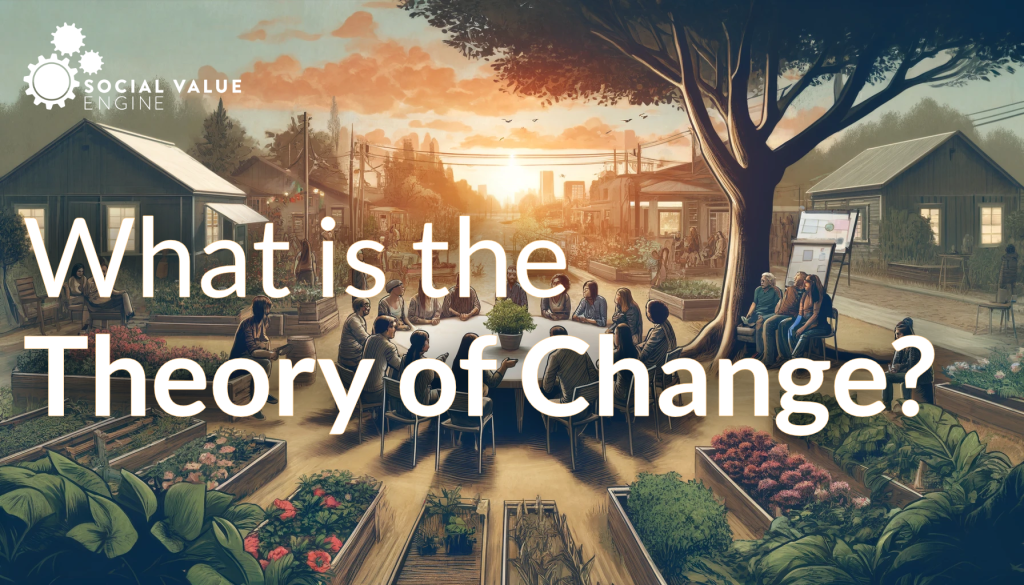The Theory of Change (ToC) is a widely adopted framework across various sectors, including social enterprises and local authorities. This model provides a robust approach to planning and implementing strategies that lead to meaningful and sustainable social change.
At its core, the Theory of Change compels organisations to consider the ‘why’ and ‘how’ behind their actions before implementation. It involves a thorough examination of the current situation, delineation of clear objectives, and meticulous planning of activities to achieve these goals. This framework offers a comprehensive description of how and why a desired change is expected to occur in a particular context, emphasising the identification of long-term goals and working backwards to determine all the necessary conditions (outcomes) for these goals to materialise.
Key Components of the Theory of Change
- Inputs: These are the resources required to implement the planned activities, such as funding, personnel, and equipment.
- Activities: This component represents the specific actions undertaken to achieve the desired goals. Examples include launching training programmes, providing financial aid, or hosting workshops.
- Outputs: These are the immediate, tangible results of the activities. For instance, a job creation programme might aim to create a specific number of new employment opportunities.
- Outcomes: These represent the broader, medium-term impacts of the outputs. In the job creation programme example, outcomes could include increased future employability of participants or enhanced economic competitiveness of the local community.
- Impact: This refers to the long-term, sustainable change that the programme aims to achieve, such as reduced poverty rates or improved quality of life in a community.
- Assumptions: These are the underlying beliefs about how change will occur within the given context. Identifying and testing these assumptions is crucial for the model’s effectiveness.
Stakeholder Engagement and Implementation Challenges
Effective stakeholder engagement is critical in the Theory of Change process. It ensures that diverse perspectives are considered, enhancing the inclusivity and relevance of the planned goals and activities. Stakeholders, including community members, project beneficiaries, funders, and implementing partners, should be involved from the outset. This collaboration helps in setting realistic and mutually agreed-upon outcomes, which can significantly boost the commitment and accountability of all parties involved.
However, engaging stakeholders also presents challenges, such as aligning varied interests and expectations. To address these, organisations should establish clear communication channels and regular feedback mechanisms to ensure ongoing dialogue and adjustment of the Theory of Change as needed. Another common challenge is the complexity of measuring long-term impact, particularly when stakeholders expect quick results. To mitigate this, it’s beneficial to set and agree on short-term indicators that can demonstrate early success and maintain stakeholder support while working towards more substantial, long-term outcomes.
In implementing the Theory of Change, it is crucial to remain adaptable, acknowledging that changes in the external environment may necessitate adjustments to the planned activities and outcomes. Continuous learning and adaptation, supported by robust data collection and analysis, can help organisations navigate these changes effectively, ensuring that the Theory of Change remains a dynamic tool that drives real and sustainable impact.
Measuring Impact
Complemented with appropriate impact measurement tools like the Social Value Engine, the Theory of Change empowers organisations to maximise their positive impact. By clearly defining objectives, outlining activities, and establishing measurable outcomes, organisations can demonstrate the social return on investment of their work. This allows them to effectively communicate their impact to funders, stakeholders, and the wider community.
The Theory of Change provides a structured approach to planning and implementing social change initiatives. By thoroughly considering each component of the model and engaging stakeholders throughout the process, organisations can develop more effective strategies for creating lasting, positive impact in their communities and beyond.





